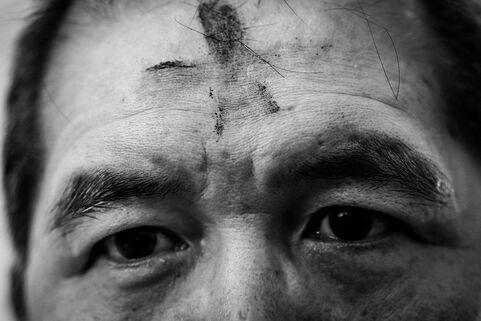 Ash Wednesday Mark 14:1–9 February 26, 2020 St. John’s Lutheran Church—Chicago, IL Our Lenten meditations this year will focus on eyes, that is, how we see things—correctly or not. As He makes His way to the cross, all eyes are on Jesus but what do they see? Only through the cross can we see clearly to see Jesus our Savior. The passion account from Mark’s Gospel will provide our eyes for the season, and tonight’s eyes are misjudging eyes. The disciples see something unexpected, but they need Jesus to see correctly. It was now two days before the Passover and the Feast of Unleavened Bread. And the chief priests and the scribes were seeking how to arrest him by stealth and kill him, for they said, “Not during the feast, lest there be an uproar from the people.” And while he was at Bethany in the house of Simon the leper, as he was reclining at table, a woman came with an alabaster flask of ointment of pure nard, very costly, and she broke the flask and poured it over his head. There were some who said to themselves indignantly, “Why was the ointment wasted like that? For this ointment could have been sold for more than three hundred denarii and given to the poor.” And they scolded her. But Jesus said, “Leave her alone. Why do you trouble her? She has done a beautiful thing to me. For you always have the poor with you, and whenever you want, you can do good for them. But you will not always have me. She has done what she could; she has anointed my body beforehand for burial. And truly, I say to you, wherever the gospel is proclaimed in the whole world, what she has done will be told in memory of her.” The disciples saw a waste, but Jesus saw faith because Anointing Is Preparation for Burial, and with Jesus Burial Is Preparation for Resurrection Jesus gives a little scrutiny to good works and spiritual disciplines, which is helpful at the beginning of a season of fasting and spiritual discipline. When you fast, don’t be like the hypocrites, says Jesus. This is good advice, since any of our disciplines can easily turn into hypocrisy, whether it be fasting, ashes, signing the cross, or throwing your hands up during a praise and worship chorus. If any of these turn into a sign of self-expression, then they signal hypocrisy. So perhaps this is why the disciples were so judgmental. What a waste! What a show-off! That perfume cost almost a year’s salary. She could have done so much with it—fed the poor, clothed some kids. But Jesus chides them. “Leave her alone. Why do you trouble her? She has done a beautiful thing to me. For you always have the poor with you, and whenever you want, you can do good for them. But you will not always have me. I can’t help but hear Jesus calling them out because they have had opportunities to do precisely what they think the woman should have done, but didn’t. Aren’t we always sizing each other up? Haven’t you looked across this church and saw what your brother or sister in Christ does during worship, and thought to yourself, what a waste! What a show-off! Haven’t you judged your fellow redeemed for what they are doing in worship (or not doing in worship)? Like the disciples, we have judging eyes. It’s inescapable. Even when you complain that someone is judging you, you’ve already rendered a judgment on the ones judging you. What we see, we judge. There’s no way to get around it. But as is the case with every disciples of Jesus, our eyes misjudge. Jesus sees what the disciples cannot. It is a beautiful work that this woman does. We attend to the senses in worship—sight, sound, touch, taste, but we rarely think of smell apart from Easter lilies. Imagine the smell of perfume that filled that room when she broke sealed flask. It was probably a little overwhelming. Perhaps a few of the disciples coughed and choked and complained that their allergies were set off. Perhaps that was the point. One of the practices of the ancient church was to anoint the newly baptized with scented oil. The Roman Catholic Church brought this practice back in recent decades; perhaps we would do well to consider something similar. It’s a multi-sensory engagement. The words of Christ hit the ears as the water washes the body, the smell of perfume hangs heavy in the sight of the faithful illuminated by candlelight. All of this is capped with the taste of bread and wine in the Eucharist. The sensory value of the woman’s oil, though, is only part of the beautiful work she did; remember that every good deed and discipline can turn into hypocrisy. What made this work beautiful is what it confessed, not what it expressed. The anointing wasn’t about the woman; it was about Christ. She has done what she could; she has anointed my body beforehand for burial. And truly, I say to you, wherever the gospel is proclaimed in the whole world, what she has done will be told in memory of her. Man, that’s awesome. This woman without name is remembered for her oil of confession. The perfume that drips down Jesus’ beard points to His impending burial. Anointing is preparation for burial. In fact, in the early Church, that anointing that followed baptism was a sign that in baptism, we are buried with Christ. But when you’re buried with Christ, that’s not the end of the story. With Christ, burial is always preparation for resurrection. The smell of Church should always be a reminder of rising. Tonight you received an ugly anointing—some ashes from burned palm leaves, mixed with olive oil and smeared on your forehead. But that ugly smudge is a beautiful thing. Remember that you are dust, and to dust you shall return. The ashes on your forehead are a preparation for burial. But those ashes are in the shape of a cross to show that you have already been buried with Christ in baptism. Though you are returning to dust, the smell is not of death, but of resurrection. Anointing is preparation for burial, but with Christ, burial is also preparation for resurrection. Ash Wednesday begins our march to Easter. But it does not arrive at that destination except through death and the cross. But with our Lord Jesus hung on the cross, we know that death does not get the final word. The ashes let our eyes see without misjudging—the grave is entry to eternal life. In the name of + Jesus. Jacob W Ehrhard VD+MA If you benefited from this devotion and would like to support the ongoing ministry of St. John's Lutheran Church and School, click below to make a one-time or recurring contribution through our secure giving page.
0 Comments
Your comment will be posted after it is approved.
Leave a Reply. |
BlogCategories
All
SearchArchives
July 2024
|
